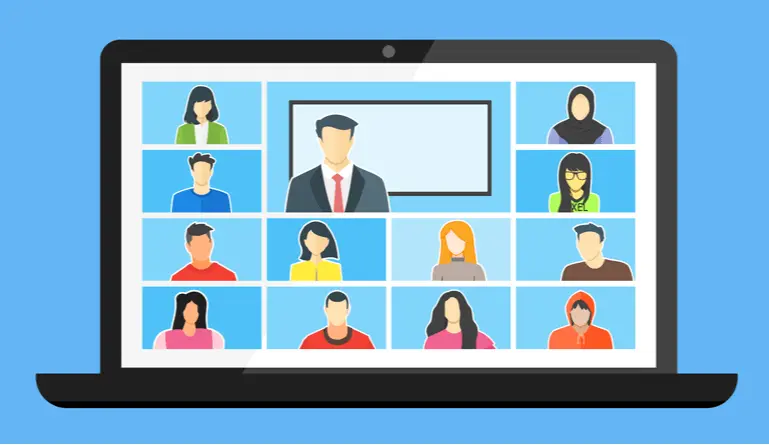From the derived data, webinars not only help people to connect and interact with people all over the world but have also proved to be helpful in increasing sales. Thus, it is no lie if we claim that webinars are the future of in-person seminars.
( Also Read: What is a Webinar & How Does it Work? )
Organizational Benefits of Webinars
In webinars, there are two parties involved: one delivering the presentation and the other attending the webinar. There are different advantages for both parties involved.
-
Affordability
Webinars are conducted online which automatically cuts down the travel cost. Other than this, the price of registration is much lower than the cost of physical seminars. Normally, most of the webinars are free of charge to attend. Moreover, multiple participants can attend a webinar at a single time and location therefore, if it is a group of people they only have to pay for one connection.
This means that the whole group can gather in one room to attend the webinar together and discuss any queries or ask any questions. This saves time and money, unlike a physical seminar.
-
Knowledgeable experts
Webinars are conducted by veteran scholars or well-educated people to pass on their knowledge to others. Most of the webinars have multiple experts. They have some of the most esteemed experts; from great businessmen to consultants to product specialists to a CSS officer.
During the webinars, experts engage with the audience through video conference calls and interact and answer any queries that the audience can have through question and answer sessions and polls.
-
Relevant topics
Webinars are less time-consuming, unlike physical seminars. This places them in a better position to give out the relevant and necessary information to the audience. In-person seminars require prior planning which can take up to several months. For example, if one wants to make people aware of the side effects of droughts, they can easily conduct a webinar within allocated time rather than waiting for weeks or months.
-
Convenience
The flexibility of webinars allows the people involved to be at ease. Since they are conducted online (through the internet), the need of leaving the office or any place you are in, is eliminated. This has made it easier for many professionals to deliver knowledge and train the audience as it saves a lot of time consumed through traveling.
Other than this, even if someone misses the webinar, they can have access to the archives of the event whenever convenient. Plus point is, you can only listen to the webinars anytime, anyplace. If you do not feel like getting formally ready, it is best for you.
Benefits of Creating Webinars
You can offer enormous value
Webinars are some of the highest converting forms of marketing. One of the most important reasons why businesses conduct webinars is to deliver tremendous value. If done correctly, webinars are proved to be better than any in-person seminars or training sessions.
It is because of its flexibility. You can keep your audience busy and entertained for hours by simply showing videos and audio information. This requires little to almost no effort. Other than this, your audience can also interact by asking questions and pouring in feedback.
Moreover, you can also ask your audience questions to keep them actively engaged. This way you can get your audience to take action and even sometimes, contradict your points to know they are listening with concentration.
They place you in your field as an expert
Shall we go for a free of cost webinar? Will it even do any good to us? Well, yes. It will not only attract a lot of people but will also show how important your webinar is to your company. It is “free of cost” does not mean your audience will not exchange anything for the content.
In order to conduct a qualified webinar, you have to register your prospect, confirmed the date, and set a time for your event, and most importantly, be punctual. This behavior shows the audience that you are concerned and positions you as an expert before you even start delivering the content.
You Can Make Sales without Selling Hard
The art of conducting successful webinars and presenting yourself as an expert is to have the right kind of content. With the right content, your webinars will automatically sell your prospects without putting in a lot of effort. One mistake that a lot of businesses make is; first teach then sell. One should do both at the same time; teach and sell at the same time.
To conduct effective webinar content, you should present problems, give solutions, and deliver value without being too bookish and teaching too much. One key to a good webinar is to keep your audience engaged by teaching them “what” to want. Here, this “What” is your product. By doing so, your audience knows what they are in for even before you make the offer.
You Can Communicate Globally, All Kinds of People
This is why webinars are considered a great success. Having to talk to hundreds of people, virtually, that too at one time and one place? What else do experts with busy schedules want? I mean imagine, not having to leave a chair, bed, or comfortable sofa.
Well, a lot of people would contradict this point saying that in-person conversations are a better way to have formal talks, but is traveling around just for one-on-one dealings really worth it? Hence, what a lot of people prefer is webinars, to save both; time and cost.
Audience Engagement
Two main purposes of webinars are; they are a one-time event conducted live and online, unlike in-person seminars where if someone joins late, they miss the part. And if someone completely misses it, they miss all of it. This is where the webinar comes in handy. Even if you miss it, you can search up the archives and re-watch it.
The second reason is the conversational engagement. Webinars make it a two-way engagement. Here, both the parties involved can interact, chat, and clear whatever queries they have. This shows interest and activeness.
Generate New Leaders
Every business has leaders. This helps them grow. But many of the businesses out there lack good quality leaders. This is where webinars help. They are a great way of attracting new mindsets, generating new leads, and new customers.
Building New Relationships
Through webinars, companies and organizations can gain new valuable relationships by offering their value first. It has a few steps; the first being giving proper insights and education. Webinars allow the audience to understand why your product is valuable and why they should consider it.
Invite Guest and Also Attract Their Audiences (Credibility)
Webinars allow you to invite experienced educated people and help their knowledge grow by promoting it. In return, they happily help leverage their audience to drive attendees.
Proven-to-convert Webinar and Affiliations
Affiliates want two things: something that will convert well and something that will deliver value to the customer. If they get these two, they will surely promote your product.
ROI And Speeding Up Sales Process
Revenues help your business grow. Companies’ main focus is cash flow. The faster you convert a lead into a customer, the better the return. Hence, deliver value, and kill objections as fast as you could.
Improving an organization’s online content
Webinars help to enhance your company’s content as you can get the audience’s feedback hand to hand. Your audience participates in polls and question-answer sessions to answer any sort of queries they have regarding your content and what you present to the audience.
Sharing information with the audience
One reason why people actually prefer webinars is interactive flexibility. So, in order to achieve a successful webinar and gain loyal customers to turn them into leads, you must share the necessary information with your audience.
Final Thoughts
Webinars are perfect sales generators. It works by conducting an online seminar, where the company (who presents) and audience (people attending) are involved. Among the many advantages, the most important is helping to capture customers to convert them into leads in the future. It works by providing necessary information to the audience and answering their queries through polls and question/answer sessions.









